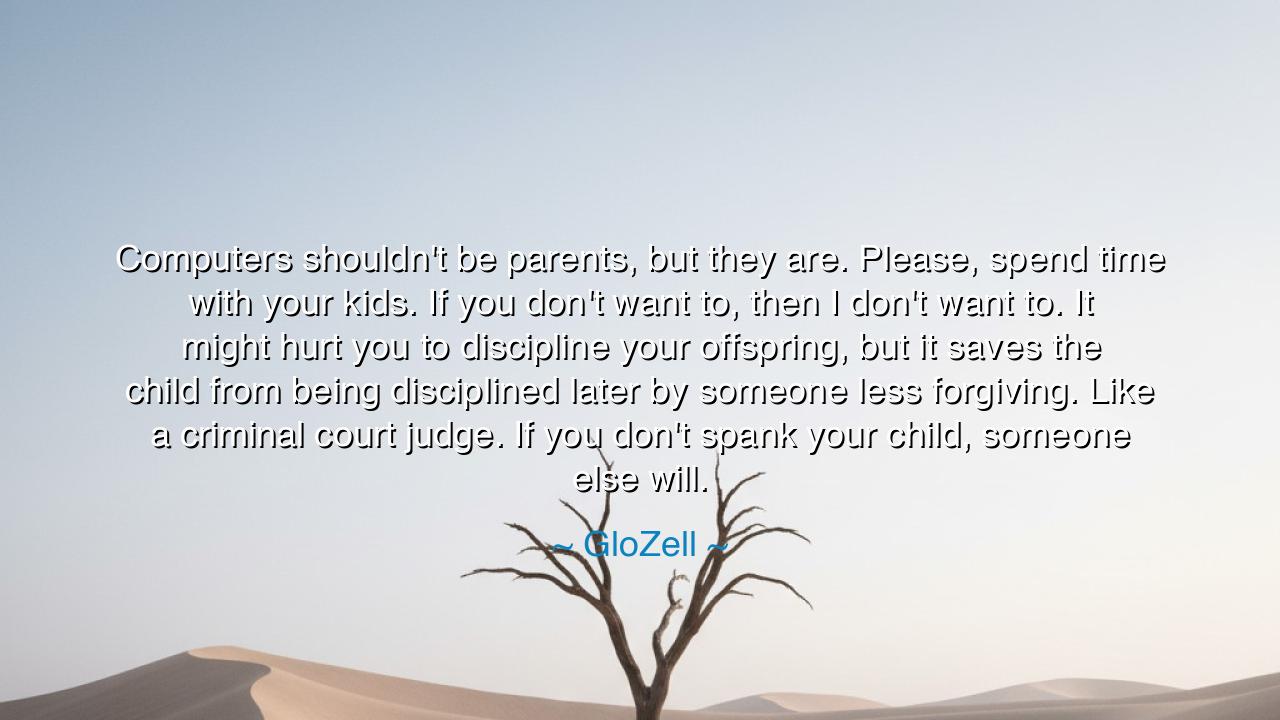
Computers shouldn't be parents, but they are. Please, spend time
Computers shouldn't be parents, but they are. Please, spend time with your kids. If you don't want to, then I don't want to. It might hurt you to discipline your offspring, but it saves the child from being disciplined later by someone less forgiving. Like a criminal court judge. If you don't spank your child, someone else will.






"Computers shouldn't be parents, but they are. Please, spend time with your kids. If you don't want to, then I don't want to. It might hurt you to discipline your offspring, but it saves the child from being disciplined later by someone less forgiving. Like a criminal court judge. If you don't spank your child, someone else will." These words by GloZell speak to the heart of a truth that has echoed throughout human civilization: parenting is a sacred responsibility, one that demands our attention, our discipline, and our love. In a world where technology increasingly takes the place of human connection, this statement serves as a warning, reminding us of the dangers of neglecting our children in favor of machines or distractions. The metaphorical idea that computers can "parent" speaks to a larger issue—the disconnect between parents and their children as they become absorbed in the technological world.
In the ancient world, the Greeks and Romans understood that the education and upbringing of a child were the foundations of society. Plato, in his work The Republic, spoke of the importance of nurturing the soul of the child through education, discipline, and wisdom. He believed that to raise a child well was to shape the future of society itself. Likewise, the Romans held that the family was the cornerstone of their civilization, and the responsibility of raising children was seen as a sacred trust. In this context, the idea that a parent might neglect their duty in favor of external distractions—be they technology, work, or selfish desires—would have been seen as a great tragedy.
Consider the story of Socrates, who believed that education was not only the acquisition of knowledge, but the cultivation of virtue and moral character. His influence on Plato and others shows that the early philosophers knew well that a child's development depended on the guidance of responsible, loving adults who could teach discipline and instill ethics. Socrates was not just a teacher of the mind, but of the soul, shaping the future generations of Athens through the questioning and disciplining of their beliefs. This example teaches us that parenting, though at times difficult, requires a balance of nurturing and discipline to shape children into responsible adults.
In modern society, we see the rise of technology—smartphones, computers, and other devices—taking more and more of our attention, pulling parents away from their children. The advent of the digital age has meant that many children now interact more with screens than with their families. This phenomenon leads to a growing disconnection between the parent and child, as time spent together is often spent in parallel isolation, each absorbed in their own world. The need for personal connection and discipline is greater than ever, as children are increasingly left to form their values and understandings of the world without sufficient guidance.
GloZell’s quote reminds us that discipline is not a form of cruelty or neglect, but a necessary act of love. Like the wise leaders of the past, the modern parent must balance nurturing with corrective action. The act of discipline, when delivered with love and wisdom, teaches children boundaries, respect, and accountability. These lessons are not just for the child’s immediate benefit, but for their long-term growth into responsible, empathetic, and self-disciplined adults. The role of the parent cannot be replaced by technology or external authorities. If we fail to instill these lessons at home, the child may face far harsher consequences later in life, as GloZell warns—the discipline they would have received from a loving parent might be met with the severity of the legal system, a cold and unforgiving force.
The lesson here is clear: parenting requires our time, effort, and presence. Just as the ancient philosophers saw education as a moral responsibility, we must view parenting as an active, daily commitment to shaping our children’s hearts and minds. While it is easier to allow technology to step in and fill the void, we must remember that the most valuable resource we can give our children is our time—to listen, to guide, and, when necessary, to discipline them. The future of our society depends not just on how much we can afford to give them materially, but on how much wisdom, love, and care we invest in their upbringing.
In practical terms, this means that we must consciously set aside time to be present with our children, to engage with them, and to provide them with the guidance they need. Let us not be swayed by the ease of distractions, but instead, embrace the challenge of parenthood with dedication and love. Let us discipline with compassion, teach with patience, and guide with wisdom—knowing that the future of our children, and indeed society itself, rests in the hands of those who choose to lead with both love and authority.






AAdministratorAdministrator
Welcome, honored guests. Please leave a comment, we will respond soon